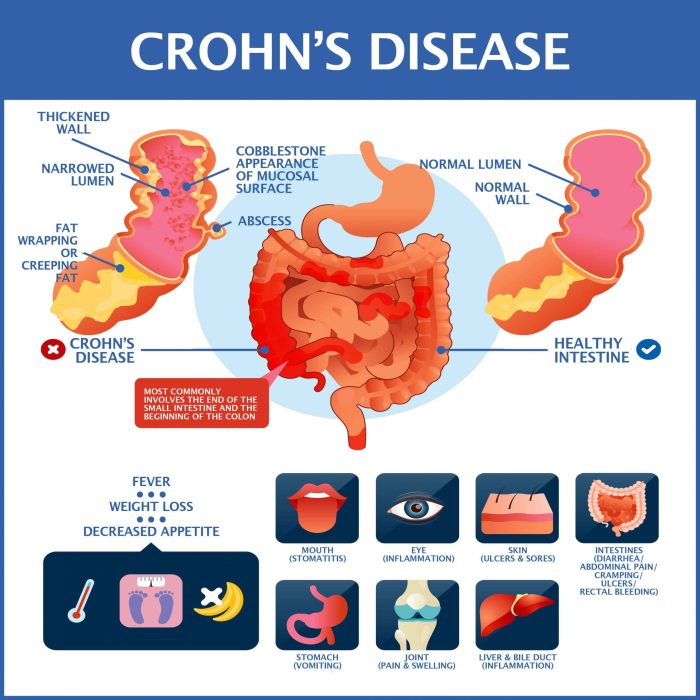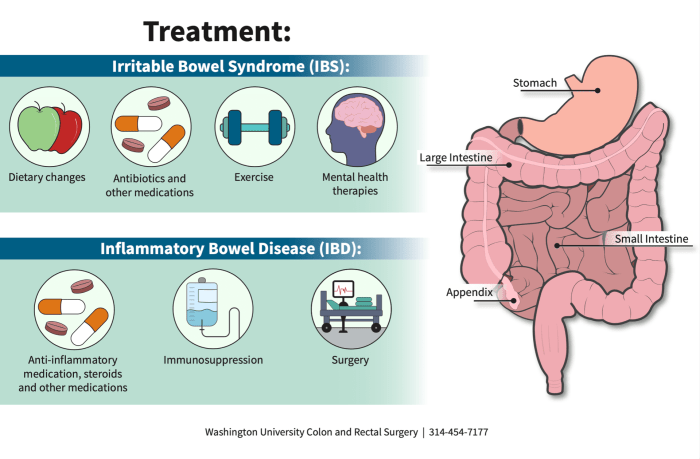
New Crohn’s Disease Treatments in 2025: What’s Working sets the stage for this enthralling narrative, offering readers a glimpse into a story that is rich in detail and brimming with originality.
As we delve into the latest trends and therapies for Crohn’s disease, the landscape of treatment options in 2025 is both promising and innovative.
Overview of Crohn’s Disease Treatments

Crohn’s disease is a chronic inflammatory condition of the digestive tract that has been challenging to manage effectively. Over the years, various treatments have been developed to help alleviate symptoms and improve the quality of life for patients.
History of Crohn’s Disease Treatments
Crohn’s disease was first described in 1932, and treatment options have evolved significantly since then. Initially, surgery was the primary method of managing the disease. However, as medical knowledge advanced, new medications and therapies were introduced to target inflammation and alleviate symptoms.
Current Standard Treatments
The current standard treatments for Crohn’s disease typically involve a combination of medications, lifestyle changes, and sometimes surgery. Common medications include anti-inflammatory drugs, immunosuppressants, and biologic therapies. These treatments aim to reduce inflammation, control symptoms, and prevent flare-ups.
Challenges Associated with Traditional Treatments
While traditional treatments have been effective for many patients, they also come with challenges. Some medications can have significant side effects, such as increased risk of infections or long-term complications. Additionally, not all patients respond well to conventional therapies, leading to the need for alternative treatment options.
Emerging Trends in Crohn’s Disease Treatments

Crohn’s disease treatment research has seen significant advancements in recent years, paving the way for more effective and personalized treatment options. The integration of technology has played a crucial role in shaping the landscape of Crohn’s disease treatments, offering new possibilities and approaches to managing the condition.
Personalized Medicine in Crohn’s Disease Treatments
Personalized medicine has revolutionized the approach to treating Crohn’s disease by tailoring treatment plans to individual patients based on their genetic makeup, lifestyle factors, and disease characteristics. Through precision medicine, healthcare providers can identify the most effective therapies for each patient, minimizing trial and error in treatment selection.
This approach not only improves treatment outcomes but also reduces the risk of adverse effects, ultimately enhancing the quality of life for individuals living with Crohn’s disease.
Role of Technology in Crohn’s Disease Treatments
Technology has played a pivotal role in advancing Crohn’s disease treatments, offering innovative solutions for monitoring disease activity, predicting flare-ups, and delivering targeted therapies. Telemedicine and mobile health applications have made it easier for patients to communicate with their healthcare providers, track their symptoms, and access support remotely.
Additionally, artificial intelligence and predictive analytics have enabled healthcare professionals to analyze large volumes of data to identify patterns and trends in disease progression, leading to more precise and timely interventions. With the integration of technology, the future of Crohn’s disease treatments looks promising, offering personalized care and improved outcomes for patients.
Promising Therapies on the Horizon
Crohn’s disease research has been advancing rapidly, leading to the development of promising new therapies that could revolutionize treatment options for patients. From innovative drug therapies to cutting-edge surgical techniques, the future looks bright for individuals living with this chronic condition.
New Drug Therapies
- One of the most exciting developments in Crohn’s disease treatment is the emergence of targeted therapies that aim to address the underlying causes of inflammation. These drugs work by blocking specific molecules or pathways involved in the disease process, offering a more personalized approach to treatment.
- Another area of active research is the exploration of novel biologics and biosimilars designed to provide effective symptom relief with fewer side effects. These medications are engineered to mimic the actions of naturally occurring proteins in the body, helping to restore balance and reduce inflammation.
Innovative Surgical Techniques
- Advancements in minimally invasive surgical techniques have shown great promise in improving outcomes for patients with Crohn’s disease. Procedures such as laparoscopic surgery and robotic-assisted surgery offer reduced pain, faster recovery times, and lower risk of complications compared to traditional open surgery.
- Researchers are also exploring the potential of stem cell therapy and tissue engineering to repair damaged intestinal tissues in patients with Crohn’s disease. These regenerative approaches hold the potential to restore normal function and prevent disease progression in the long term.
Impact of Biologics and Biosimilars
- Biologics and biosimilars have transformed the management of Crohn’s disease by providing targeted therapy that can effectively control symptoms and induce remission in many patients. These medications have significantly improved quality of life and reduced the need for long-term corticosteroid use.
- With the growing availability of biosimilars, there is hope for increased access to these life-changing treatments at a more affordable cost. This could potentially expand treatment options for a larger number of patients, ensuring better outcomes and improved disease management overall.
Patient Perspectives and Experiences
Patients living with Crohn’s disease often have unique experiences with different treatments. These personal stories can provide valuable insights into the effectiveness and challenges of new therapies.
Individual Stories of Trying New Crohn’s Disease Treatments
Many patients have shared their experiences of trying out new treatments for Crohn’s disease. One such individual, Sarah, found relief from her symptoms after starting a biologic medication. She noticed a significant improvement in her quality of life and was able to resume activities she had previously given up on.
On the other hand, John tried a different therapy that did not work well for him. He experienced severe side effects and had to discontinue the treatment. His journey highlights the importance of personalized medicine and finding the right approach for each patient.
Importance of Patient Engagement in Treatment Decisions
Engaging patients in the decision-making process regarding their treatment is crucial for successful outcomes. Patients who are actively involved in discussions about their care tend to have better adherence to their treatment plans and overall satisfaction with their healthcare journey.
By considering patient preferences, lifestyle factors, and treatment goals, healthcare providers can tailor therapies to meet individual needs, leading to improved treatment outcomes and quality of life for patients with Crohn’s disease.
Challenges Patients May Face When Accessing New Treatments
Despite advancements in Crohn’s disease treatments, patients may encounter challenges when trying to access new therapies. Some barriers include limited insurance coverage for certain medications, high out-of-pocket costs, and delays in approval processes.
Additionally, geographical disparities and limited availability of specialized healthcare facilities can pose obstacles for patients seeking innovative treatments. Addressing these challenges requires collaboration between healthcare providers, policymakers, and patient advocacy groups to ensure equitable access to emerging therapies for all individuals living with Crohn’s disease.
Last Word
In conclusion, the future of Crohn’s disease treatments in 2025 looks bright with exciting advancements on the horizon. Patients and healthcare providers alike can look forward to a new era of improved outcomes and quality of life.
FAQ
What are some potential new drug therapies for Crohn’s disease?
Some potential new drug therapies include targeted biologics and small molecule inhibitors that aim to provide more specific and effective treatment options.
How is technology shaping the landscape of Crohn’s disease treatments in 2025?
Technology is playing a significant role in improving disease management through tools like telemedicine, remote monitoring, and personalized treatment plans tailored to individual patients.
What challenges might patients face when accessing new Crohn’s disease treatments?
Patient access to new treatments can be hindered by factors such as cost, insurance coverage, and availability of specialized healthcare providers familiar with the latest therapies.












